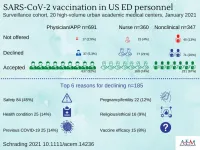(Press-News.org) UNIVERSITY PARK, Pa. -- When the COVID-19 pandemic hit in early 2020, many families found themselves suddenly isolated together at home. A year later, new research has linked this period with a variety of large, detrimental effects on individuals' and families' well-being and functioning.
The study -- led by Penn State researchers -- found that in the first months of the pandemic, parents reported that their children were experiencing much higher levels of "internalizing" problems like depression and anxiety, and "externalizing" problems such as disruptive and aggressive behavior, than before the pandemic. Parents also reported that they themselves were experiencing much higher levels of depression and lower levels of coparenting quality with their partners.
Mark Feinberg, research professor of health and human development at Penn State, said the results -- recently published in the journal Family Process -- give insight into just how devastating periods of family and social stress can be for parents and children, and how important a good coparenting relationship can be for family well-being.
"Stress in general -- whether daily hassles or acute, crisis-driven stress -- typically leads to greater conflict and hostility in family relationships," Feinberg said. "If parents can support each other in these situations, the evidence from past research indicates that they will be able to be more patient and more supportive with their children, rather than becoming more harsh and angry."
Feinberg added that understanding what can help parents maintain positive parenting practices, such as a positive coparenting relationship, is key for helping protect children during future crises -- whether those crises are pandemics, economic shocks or natural disasters.
While cross-sectional studies have suggested there has been a negative impact of the pandemic on families, the researchers said this study is one of the first to measure just how much these factors have changed within families before and after the pandemic hit.
According to the researchers, previous research has found that periods of financial stress, such as the Great Depression and the 2008 recession, have led to higher levels of parent stress, mental health problems and interparental conflict, which can all lead to more harsh, and even abusive, parenting.
When the COVID-19 pandemic hit, Feinberg said it led to not only financial stress within families, but also problems related to being isolated together, issues managing work and childcare, and general fear related to the sudden health threat that was poorly understood.
"When the pandemic hit, like many people, I was very anxious and worried," Feinberg said. "I saw the tensions and difficulties my daughter and I were having being home together 24/7. So, when I realized that our existing studies and samples of families gave us an opportunity to learn something about how families would cope during the crisis, my team and I moved into action."
For the study, the researchers used data from 129 families, which included 122 mothers and 84 fathers, with an average of 2.3 children per family. The parents answered an online questionnaire that asked them about their depressive symptoms, anxiety, the quality of their relationship with their coparent, and externalizing and internalizing behavior they observed in their children, among other measures.
Because the participants were part of a longer study measuring these factors over prior years, the researchers already had data on these parents and children from before the pandemic.
The researchers found that parents were 2.4 times more likely to report "clinically significant" high levels of depression after the pandemic hit than before. They were also 2.5 times and 4 times more likely to report externalizing and internalizing problems, respectively, in their children at levels high enough that professional help might be needed.
Feinberg said that while it makes sense that families would experience these difficulties, he was shocked at the magnitude of the declines in well-being.
"The size of these changes are considered very large in our field and are rarely seen," Feinberg said. "We saw not just overall shifts, but greater numbers of parents and children who were in the clinical range for depression and behavior problems, which means they were likely struggling with a diagnosable disorder and would benefit from treatment."
Feinberg put the size of the declines in parent and child well-being in perspective by pointing out that the increase in parents' levels of depressive symptoms in the first months of the pandemic was about twice as large as the average benefit of antidepressants.
The researchers said that as the risk of future pandemics and natural disasters increases with the effects of climate change, so will the likelihood of families facing stressful conditions again in the future
"Getting ready for these types of crises could include helping families prepare -- not just by stocking up on supplies, but also by improving family resiliency and psychological coping resources," Feinberg said. "In my view, that means providing the kinds of family prevention programs we've been developing and testing at the Prevention Research Center for the past 20 years."
For example, Feinberg explained that their research shows that the Family Foundations program helps new parents develop stronger capacities for cooperation and support in their relationship with each other as coparents, which is a key dimension of family resiliency.
Feinberg said future research will examine whether families who went through Family Foundations or other programs were more resilient, maintained better family relationships, and experienced smaller declines in mental health during the pandemic.
INFORMATION:
Jacqueline Mogle, Jin-Kyung Lee, Samantha L. Tornello, Michelle L. Hostetler, Joseph A. Cifelli and Sunhye Bai, all at Penn State; and Emily Hotez, University of California, also participated in this work.
The National Institute of Child Health and Development and The Huck Institutes of the Life Sciences at Penn State helped support this research.
Young scientists from NUST MISIS have presented multilayer antibacterial coatings with a prolonged effect and a universal spectrum of action. The coating is based on modified titanium oxide and several antiseptic components. The coatings can be used in modern implantology as a protective layer for the prevention of concomitant complications - inflammation or implant rejection. The results of the work have been published in the international scientific journal Applied Surface Science.
Antibacterial coatings are currently being actively researched, as the search for alternatives to traditional antibiotics is growing. They can be applied to implants, thereby preventing inflammation caused by nosocomial infections.
Nevertheless, the creation of antibacterial, but at the same time biocompatible ...
DES PLAINES, IL - At the beginning of prioritized health care personnel (HPC) immunization, there was a high rate of COVID-19 vaccine acceptance and receipt, with physicians and advance practice providers having the highest overall proportion. These are the findings of a surveillance project on COVID-19 vaccination rates among emergency department staff at United States academic medical centers, which will be published in the April issue of the Academic Emergency Medicine (AEM) journal, a peer-reviewed journal of the Society for Academic Emergency Medicine (SAEM).
The project report, published in a ...
BOSTON - Medical cannabis products are not always what they seem, according to a new study led by researchers at the Massachusetts General Hospital (MGH).
In fact, the contents of these products can vary considerably from distributors' claims, according to the study, published in JAMA Network Open. This is particularly important when THC, the metabolite responsible for the "high" cannabis provides, is present in medical cannabis products labeled to be CBD only.
As more states legalize cannabis sales, demand has increased. However, there is little consistency in product regulation or labeling, unlike the strict regulation of medicines purchased through a pharmacy. As a result, labeling is often not accurately informing patients of the content of the ...
Whether eating out or buying food from the grocery store, Americans of all ages are, for the most part, eating poorly everywhere--except at school. The information comes from a new dietary trends study, which also reveals persistent or worsening disparities in meal quality from restaurants, grocery stores, and other sources--but not school--by race, ethnicity, and income.
Published today in JAMA Network Open and led by researchers at the Gerald J. and Dorothy R. Friedman School of Nutrition Science and Policy at Tufts University, the study analyzed all meals (including snacks and beverages) consumed by Americans over 16 years.
By 2018, ...
What The Study Did: The results of incorporating HIV screening into COVID-19 testing at an emergency department in Chicago are reported in this study.
Authors: David Pitrak, M.D., of the University of Chicago Medicine, is the corresponding author.
To access the embargoed study: Visit our For The Media website at this link https://media.jamanetwork.com/
(doi:10.1001/jamainternmed.2021.0839)
Editor's Note: The article includes conflicts of interest and funding/support disclosures. Please see the article for additional information, including other authors, author contributions and affiliations, conflict of interest and financial disclosures, and funding and support.
INFORMATION:
Media advisory: The full study is linked to this news release.
Embed this link ...
What The Study Did: Changes in quality of diet from different sources of food among U.S. children and adults from 2003 to 2018 were examined in this survey study.
Authors: Junxiu Liu, Ph.D., of the Icahn School of Medicine at Mount Sinai in New York, is the corresponding author.
To access the embargoed study: Visit our For The Media website at this link https://media.jamanetwork.com/
(doi:10.1001/jamanetworkopen.2021.5262)
Editor's Note: The article includes conflicts of interest and funding/support disclosures. Please see the article for additional information, including other authors, author contributions ...
What The Study Did: Researchers compared the risk of death between infants with and without prenatal opioid exposure and also the difference in risk if diagnosed with neonatal opioid withdrawal syndrome.
Authors: JoAnna K. Leyenaar, M.D., Ph.D., M.P.H., of Children's Hospital at Dartmouth-Hitchcock Medical Center in Lebanon, New Hampshire, is the corresponding author.
To access the embargoed study: Visit our For The Media website at this link https://media.jamanetwork.com/
(doi:10.1001/jamapediatrics.2021.6364)
Editor's Note: The article includes conflict of interest and funding/support disclosures. Please see the article for additional information, including ...
What The Study Did: This study used data from a national database to compare clinical outcomes of surgical patients with and without COVID-19.
Authors: Max R. Haffner, M.D., of the University of California, Davis, in Sacramento, is the corresponding author.
To access the embargoed study: Visit our For The Media website at this link https://media.jamanetwork.com/
(doi:10.1001/jamanetworkopen.2021.5697)
Editor's Note: The article includes conflicts of interest and funding/support disclosures. Please see the article for additional information, including other authors, author contributions and affiliations, conflict of interest and financial disclosures, and funding and support.
INFORMATION:
Media advisory: The full study is linked to this news release.
Embed this link ...
What The Study Did: This modeling study estimates COVID-19-related changes in rates of colorectal cancer screenings and associated outcomes and estimates the degree to which expanded fecal immunochemical testing could potentially mitigate these outcomes.
Authors: Rachel B. Issaka, M.D., M.A.S., of the Fred Hutchinson Cancer Research Center in Seattle, is the corresponding author.
To access the embargoed study: Visit our For The Media website at this link https://media.jamanetwork.com/
(doi:10.1001/jamanetworkopen.2021.6454)
Editor's Note: The article includes conflict of interest and funding/support disclosures. Please see the article for additional information, including other authors, author contributions and affiliations, conflict of interest and financial disclosures, and ...
Using an innovative protein-based approach, researchers at the Atlanta Veterans Affairs Medical Center and nearby Emory University have found genes and corresponding proteins that could point the way to new depression treatments.
Using a proteome-wide association study (PWAS) that integrated genome-wide association study (GWAS) data with human brain proteomic and genetic data, researchers have identified 19 genes that may lead to depression by altering brain protein levels. They also pinpointed 25 such proteins that offer promise as potential targets for new depression treatments.
The researchers detail their approach and findings in April 2021 in the journal Nature ...



